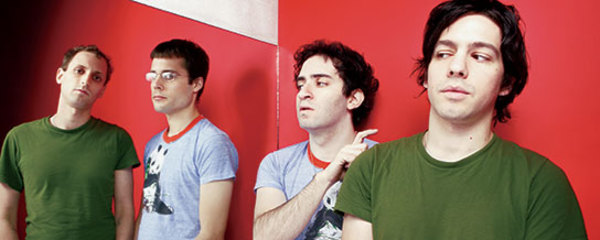Supersystem’s Political Dance Punk
It is debatable whether dance punk is dying, or whether dance punk’s flag is just […]
Supersystem’s Political Dance Punk
It is debatable whether dance punk is dying, or whether dance punk’s flag is just […]

It is debatable whether dance punk is dying, or whether dance punk’s flag is just getting raised. Franz Ferdinand and Interpol are as ubiquitous as the phone bill, and there are many, many imitators praying to be floated to golden shores by the nu-disco tide. Then there is Supersystem, who you may remember by their recently retired moniker El Guapo.
The combo started life as avant noodlers who favored reed-instrument solos and free jazz awkwardness over the mid-to late ‘90s Washington, DC hardcore sound. Nonetheless, after singles and a largely ignored debut on a small co-op label run by friends, the band signed with local punk stalwarts Dischord. Over the next few years, their sound and line-ups continually shifted. By the release of 2002’s Fake French, the band was decidedly song-based and their album (produced by the heavy hand of Trans Am’s Phil Manley) was laden with beeps, blips, and tumbling 4/4 cadences. Along the way, they added keyboardist Pete Cafarella (The Rapture), and half the quartet began biding time in Brooklyn, while the other half stayed rooted in DC.
After recent tours with The Rapture and Ted Leo, their tracks started showing up in Tommie Sunshine’s playlists; and, while hounded by bigger, dance-oriented labels, the boys chose to sign with Touch and Go. But a Chicago bar band with a Budweiser endorsement already trademarked their name of eight years. Letting go of El Guapo’s past, the boys ushered in a new sound with a new name: Supersystem.
Supersystem’s Touch and Go debut shows the band biting into a meatier, fuller style and ditching their snakey, fragmented free jazz ends all together. It’s one of the first dance punk albums that is actually, well, danceable. The band comes from disparate grooming and inspirations: Cafarella from the school of booming 808s; co-frontman Justin Moyer from a strict diet of Elvis; drummer Josh Blair also plays in prog power metallists Orthrelm; and other frontman Raphael Cohen listens to Afro-Latin sounds “exclusively.” Nonetheless, the band coheres into a fierce, funkdafied combo, showing their DC roots (think Trouble Funk, not Fugazi) all the way.
To listen to Moyer explain it, it’s all happy accident: “We didn’t plan on making an accessible dance album. All we set out to do was make something tighter. I think we just got sick of improvising–got tired of trying to ‘blow peoples minds’ with how out there we could get. It got boring. We realized there is absolutely nothing wrong with writing catchy songs with hooky choruses.” Especially if you are Supersystem.

